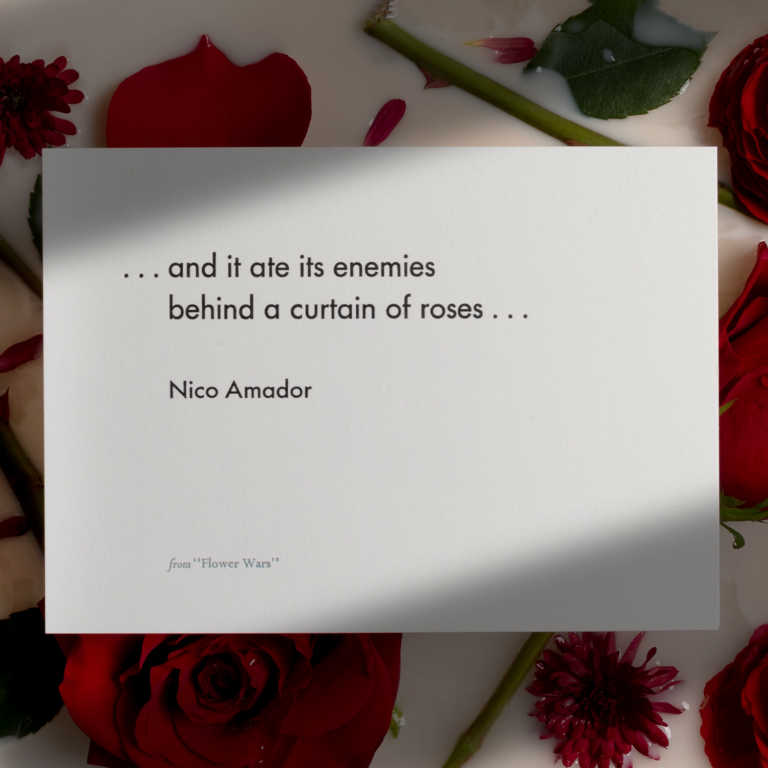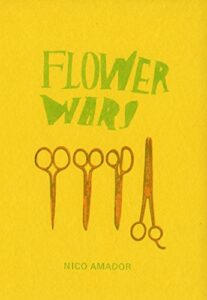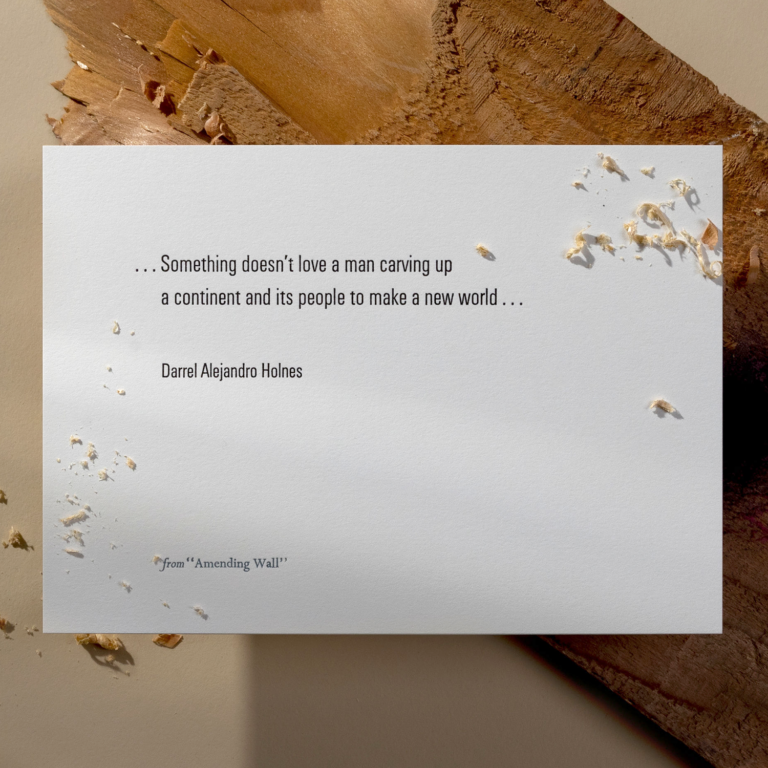Nico Amador
Flower Wars
Telling some of the story of the Flower Wars of the Aztec era, Nico Amador’s poem pits wars against creation. In a poem that begins by recalling creation myths from multiple cultures, he then poses questions about why: Why would people sacrifice their own people to keep a god happy? Why would any god benefit from people’s deaths? Evoking how the Flower Wars contributed to the Aztec downfall, this poem also wonders about wars today: Who benefits from a war? Who decides who should die? Why?

Letterpress prints by Myrna Keliher | Photography by Lucero Torres
Guest

Nico Amador has been published in a number of journals and anthologies. His chapbook, Flower Wars, was selected as the winner of the Anzaldúa Poetry Prize and was published by Newfound Press in 2017. He is a grant recipient of the Vermont Arts Council, an alumnus of the Lambda Literary Foundation's Writers Retreat and an MFA candidate at Bennington College.
Transcript
Pádraig Ó Tuama: My name is Pádraig Ó Tuama, and I’m really interested in war poetry. The Irish poet Michael Longley says that the war poems of the First World War were decorated and honored, but that he’s really glad there isn’t a lot of poetry from the Second World War, because war should never be there to bring about poetry. Poetry should be there to challenge and critique war.
[music: “Praise the Rain” by Gautam Srikishan]
“Flower Wars” by Nico Amador:
“It started with a bang
(some say a snap).
Then a watery isthmus,
a primordial goo
lipping along
under a purple steam.
Then pods shaped
like violins, then fish
wishing themselves
bigger fins, feet.
Then pterodactyl,
then mammoth.
Then ice and more ice,
the long walk, the centuries
in the wilderness,
the zigzag wander.
Then a valley.
Then a lake.
Then the herd, the golden
grain, a maze
of aqueducts singing
their blue song.
Then a city bigger than Rome,
pyramids, a god
some people called
a hummingbird.
A hummingbird
cannot be a man
but man can learn
to love a hummingbird,
to go to war for a hummingbird.
This bird was at war
with the world
and it ate its enemies
behind a curtain of roses,
and the grasshoppers
never said a word.”
[music: “Waterbourne” by Blue Dot Sessions]
I heard Nico Amador read poetry at a festival in Madrid, a few years ago; afterwards, I went and searched out the rest of his poems that were published. And when I read this poem, “Flower Wars,” in a book called Flower Wars, I was just filled with delight, because it was recognizable to me as some kind of creation myth that incorporated evolution and incorporated the Big Bang, and then incorporated specifics about gods; but those were unknown to me, the specifics. And I was so delighted by what I didn’t know that I wanted to read all around the poem and figure out what might’ve been going on.
Nico Amador is a poet with whom I feel a lot of connection, because he links poetry with questions to do with social change. And he’s been involved in all kinds of causes, in his own professional life — sanctuary policies and living wage movements; he works in groups opposing mass incarceration and against discrimination against trans and nonbinary passengers in public transport. And so, for Nico Amador, the question about language that’s used in the place of resistance and analyzing conflict, and the language that’s used in poetry, are connected. And I find that so intriguing and so exciting, and always follow along if there’s any new poems that Nico is publishing.
In a certain way, this poem is putting two ideas up against each other. It’s pitting the idea of a hummingbird god, to whom people sacrificed — and this god could never become human, but yet humans sacrificed to the god; and it’s putting that image up against an infestation of locusts or grasshoppers in the city of Tenochtitlán, the site of modern-day Mexico City. And really this poem is saying, why would you sacrifice to a god, a god of war — the hummingbird god was a god of war, in the Aztec imagination — why would you sacrifice to a god of war, when actually, you’ve got plagues and infestations, and later on, the conquistadores, against whom you should really be fighting?
[music: “Calisson” by Blue Dot Sessions]
The first part of this poem is a hop, skip, and a jump, from the Big Bang to the Aztec pyramids and aqueducts. So the Big Bang happens, or the “snap,” as he says, and then an isthmus, which is a piece of land like a natural narrow bridge, connecting two larger bodies separated by water. And then there’s the primordial goo and evolution — fish wishing for bigger fins and feet, and then pterodactyls and the Ice Age and glaciers forming valleys and the lakes that are left behind. And then, suddenly, it moves into the idea of farming and livestock and grain. And he uses the word “maze” brilliantly here, maybe “maize” referring to farming, as well as the maze of aqueducts that were so important for the formation of the city, Tenochtitlán.
And in the 1400s, in that city, which was the capital city of the Aztecs, there was an emperor, Moctezuma. And Moctezuma was an emperor over a particular period of what’s called peace, during the 1400s. Now, peace meant that Moctezuma had been successful in kind of “incorporating,” i.e., conquering, some other, nearby groups of people and saying that they were now part of the Aztec empire. But there was, locally, a period of relative cessation of intergroup warfare.
And during that time then, there were a series of plagues, one of which was a plague of locusts. Under specific conditions, certain grasshoppers can swarm, and then turn into locusts, and they completely destroy crops. And in the face of these plagues that were happening — and this wasn’t the only one, but it was an important one and the one that Nico Amador is highlighting — there was a question as to why are these plagues happening?
And so these things called “flower wars” came about as a result of that. The idea was that the gods were punishing the people of Tenochtitlán. And trying to appease those gods, these flower wars were enacted. And they weren’t people fighting with flowers. They were enactments of a certain kind of war where there were stricter rules than you might find in war, but people died. And more and more people died. Some historians suggest that some of the leaders of some of the groups that were enacting these flower wars actually thought that the more of their own died, the more that the gods would be appeased.
But what that did is it diminished the fighting population of people that were available, within these separate groups of people in the broader empire of the Aztecs, so much so that when the conquistadores arrived in the 1500s, these flower wars were continuing, and the conquistadores were able to manipulate, a, the diminished population of fighting people, and b, the existing tensions, which had been deepened as a result of these flower wars, in order to enact their colonizing enterprise.
[music: “Toothless Slope” by Blue Dot Sessions]
This poem brought me to a situation of needing to read a lot more about Aztec culture. And I mean, I’ve only just begun to read it, and hopefully can do the poem justice in the reading of this. But again, Nico Amador uses this poem as a certain way of opening up a question about today. And the question he asks about today is an age-old one: why do we contribute to our own destruction? There’s enough that’s going to be taking our attention already. Why do we divide ourselves when actually, what we need is the possibility of coming together, to collaborate together to face the things that are truly against us? What is this addictive reality that human populations can have, to turn against the possibility of being together and, in so doing, do the work of that which would undo us for it?
What are the wars we invent that actually can be distractions against the bigger, more serious things that we can be fighting against? Nico Amador is saying, why do we do that? There are serious things to fight against, i.e., hunger; i.e., actual attacks on people by colonizers. Why do we invent unnecessary wars, distracting wars, distracting conflicts and arguments? What are the ways within which we do an enemy’s work for the enemy, whether that enemy is a god or whether that enemy is a colonizing European force? What are the ways we do the work of undoing of ourselves and, in so doing, weaken ourselves so that we can’t have the power of resistance to when there is something that is actually preventable, coming against us?
[music: “Vik Fence Sahder” by Blue Dot Sessions]
“Flower Wars” by Nico Amador:
“It started with a bang
(some say a snap).
Then a watery isthmus,
a primordial goo
lipping along
under a purple steam.
Then pods shaped
like violins, then fish
wishing themselves
bigger fins, feet.
Then pterodactyl,
then mammoth.
Then ice and more ice,
the long walk, the centuries
in the wilderness,
the zigzag wander.
Then a valley.
Then a lake.
Then the herd, the golden
grain, a maze
of aqueducts singing
their blue song.
Then a city bigger than Rome,
pyramids, a god
some people called
a hummingbird.
A hummingbird
cannot be a man
but man can learn
to love a hummingbird,
to go to war for a hummingbird.
This bird was at war
with the world
and it ate its enemies
behind a curtain of roses,
and the grasshoppers
never said a word.”
[music: “Praise the Rain” by Gautam Srikishan]
Chris Heagle: Thank you to Nico Amador, who gave us permission to use his poem “Flower Wars,” from his book of the same title. Read the poem on our website at onbeing.org.
[music: “Praise the Rain” by Gautam Srikishan]
Poetry Unbound is: Gautam Srikishan, Erin Colasacco, Eddie Gonzalez, Lilian Vo, and me, Chris Heagle.
Our music is composed and provided by Gautam Srikishan and Blue Dot Sessions.
This podcast is produced by On Being Studios, which is located on Dakota land. We also produce other podcasts you might enjoy, like On Being with Krista Tippett, Becoming Wise, and This Movie Changed Me. Find those wherever you like to listen, or visit us at onbeing.org to find out more.
Books & Music
Recommended Reading
The On Being Project is an affiliate partner of Bookshop.org and Amazon.com. Any earnings we receive through these affiliate partnerships go into directly supporting The On Being Project.







